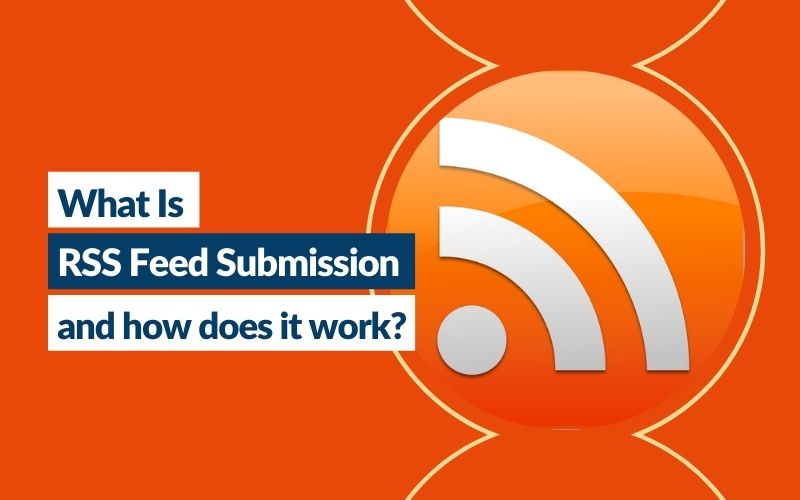What is RSS Feed submission and how does it work?
The overall goal of writing a blog or creating a podcast is to reach the audience with updated content and diversify the same to get the organic traffic on our website – and RSS feed submission does that for you!
RSS lets the user connect with all the information, including blogs, social media or podcast, on a convenient single dashboard. These updates and notifications are gathered, organised, and updated in real-time into one convenient dashboard in an RSS feed.
What could be better?
However, according to some, RSS went dormant for a while and people did not consider RSS feed submission as one of the integral parts of boosting a website’s performance, but it is not true! In fact, RSS feeds are one of the most common practices for the success of a website, content or a podcast.
So, if you’re unaware or are uncertain of an RSS feed or how to use the RSS feeds, this blog is for you.
Let’s start by talking about,
What is an RSS feed and how does it operate?
In simpler terms, RSS means Rich Site Summary and is also commonly known as Really Simple Syndication. RSS feed is the consolidated information source in one place that provides updates on any new content. It contains details about every information of content a site has published in the online file. The online files here refer to the XML files easily read by a computer and can automatically update information.
Thus, when the site comes up with new content or adds details to that content, such as the content body, summary, publication date or a link, they are automatically generated in the file and displayed in reverse chronological order.
The updated information on the site is then fetched by a user’s RSS feed reader that converts the updated information of the website and the files into an easy-to-read format.
RSS feed is helpful to stay up to date with all the new content, articles, blogs or podcasts that a site published. Moreover, the updated content is distributed in real-time and in reverse chronological order that shows the latest content at the top for any website.
So, your following question would be,
What is an RSS reader?
If you’re a coder and juggle with codes all day, you can decipher the meaning of the code and easily read the formatted content on the website, but it’s not so easy for the rest of us. So RSS reader to turn an RSS feed into something readable document.
To define, an RSS reader is an app that analyses and reads the XML code of an RSS feed and makes it look more like what you see on a website.
How to submit RSS?
RSS feed submission simply stands for submitting RSS feeds to RSS submission directory sites that helps boost your search engine ranking. The feeds are XML files that contain your site’s information in the form of URLs hosted on a server with a link that anyone can access.
RSS feed, also known as the RSS documents or a web feed, is submitted to several recipients in web feed formats. The feeds can be a blog, article or podcast that the website owners updated on the website.
The website gets the organic traffic through the users interested in these updates and subscribes to your RSS feed by entering the feed into the feed reader and providing the required details. Thus, whenever you update information on your website, the subscribers will be notified via a notification, and you will be able to reach them in real-time to boost the traffic.
Hence, an RSS feed is an ideal option for branching out the content without paying attention to the paid campaigns.
Advantages of RSS submission
Despite the drop in the popularity of RSS post the rise of social media, RSS can still boost your website’s organic performance by driving targeted traffic.
Owing to the facts that social media isn’t the best way to keep up with their new content, RSS feeds are springing back to life. Moreover, suppose your users are interested in your website’s content. In that case, it is more likely that they will look forward to subscribing to RSS rather than losing an important update among the social media clutter.
In comparison to social media, the RSS feed shows the user a reverse chronological order of all the content from the user’s sites. It lets the user distinguish the new content from the older ones easily. Moreover, there’s no loss of content and no repeats of content that gives the subscribers authentic, updated and new content.
While on the other hand, social media rarely shows everything posted by the accounts that user follows, and they let the algorithms decide the trending content and surfaces the same at the top. Thus, if the user wants to be up to date with all their favourite content, social media is not the right place.
Let’s move on to some key benefits of the RSS submission for your websites,
- RSS feed submission helps retain the interest of your readers and increases credibility by providing them updated content that quickly reaches them.
- Since the RSS feed has all the updated content, it attracts new readers searching for updates related to specific content.
- RSS feeds can improve your site’s ranking when you incorporate the main keywords or phrases in the content, title, meta or alt tags.
- RSS renders your site popularity if you are continuously providing fresh and relevant content via RSS feeds.
- The benefits through RSS feeds are linked to better traffic, enhanced organic results and quality backlinks for your website.
- RSS feed submission eliminates the manual tasks of updating on various platforms, and the content is automatically broadcasted to the subscribers.
However, to see the content that trends in the market, social media is the way to go, but if you want to get better traffic and boost your website, RSS beats social media every time.
Top RSS submission websites
Unlike other blogging websites and platforms, not all websites allow RSS feed submission. Thus, to give you a head start, here are some of the authoritative and well-known website with good traffic so that you can dive right into RSS submission and explore various areas.
- https://www.blogarama.com
- https://www.alltop.com
- https://www.feedspot.com/
- https://www.netvibes.com
- https://www.technorati.com
- https://flipboard.com
- https://www.r-bloggers.com/
- http://rssreader.com/
- http://www.msn.com
- http://www.feedstar-rss.wikidot.com
- https://www.feedburner.com
Content to submit for an RSS feed
You can submit different types of content to your RSS about the topics that interest your users the most. Chalk out some of the most trending topics and try to create multiple contents out of them. Here is a list of some content that you can submit to your RSS feed.
1. News
You can add the latest news on any topic related to your niche, and when people search for the latest about a topic, your RSS feed can come into play.
2. Photos
Photos RSS feed is one of the most popular forms of bringing up your site’s popularity. Once you add attractive pictures, infographics, and images, you can get people searching for the same topic, and you can get them to your site.
3. Following trends
If you want to rank among the blog enthusiasts and hold their interests, then you can follow the trends and add information about the topics that will reflect through your RSS feed.
4. Podcasts
Podcasts are the new buzz among people of all age groups alike. Thus, you can add the VSO content and make your content rank among the people who love to hear.
Adding these types of content are some of the examples of how you can use the RSS feed to bring traffic to your website. But you can always explore more and find new ways to optimise it.
Now that we are talking about optimisation, it’s time to talk about
Does RSS affect the SEO value of your website?
John Mueller, Google webmaster trends analyst, talks about how SEO benefits for RSS feeds don’t directly exist, but the RSS feed helps Google crawlers index your web pages faster.
Thus, we can say that the RSS feed is more like a technical help to crawl and index the content better and faster. For instance, if your website falls into the category of rapidly changing content like a news website, or a technology website with lots of upcoming content, then the RSS feed will help you stay ahead of the curve as the RSS feed will pick up on new links and crawl them quickly.
So, we can say that, even though there is no direct rank boost for the website, the RSS helps find it quicker and show it in search faster. Moreover, an increased engagement rate and targeted traffic will boost the stats and help your page rank higher.
And moving on to the exciting part.
What are the SEO benefits of RSS submission?
- RSS feeds helps to index all the content on your website efficiently and in a better way.
- Any new information that you are updating on your website will be updated quicker on Google’s search pages, thanks to RSS feed submission.
- RSS feeds helps in generating organic traffic, which in turn improves your site’s credibility and improves the SEO score by providing better backlinks.
- RSS feeds allow some other sites to build free links to your content that gives indirect traffic to your website.
- RSS feeds also result in repeat visitors to your site, which can indirectly boost the engagement metrics of your website, which have a high impact on determining the value of your pages.
After analysing the RSS feeds and the submission, we can consider RSS as a tool that further increases our website’s audience reach while providing SEO benefits as well.
Now that we’ve come so far, we suppose that you are interested in promoting your content as well. It would be best to talk a bit about how you can reach a wider audience simply by using some content syndication techniques.
What are Content syndication techniques?
Content syndication is like a barter arrangement where the third-party website gets relevant content for free by republishing web-based content. While the original content creator receives excellent exposure and backlinks to their website, which boosts their organic traffic, the party websites get free content.
Syndicating your content to authoritative sites helps you reach a wider audience, which helps your brand gain better exposure and reach.
Here are some simple content syndication techniques that you can look for if you want to promote your content
Search for the suitable website
Recycle your content by republishing your content by featuring the content on authoritative, high ranking websites that reach your target audience and have good traffic. You can search for a potential syndication website, and if your content is relevant to their website, they are likely to be interested.
Know what to syndicate
Syndication is not only about copying the content and pasting it on another website, but you should also know what to syndicate in order to get good results. For instance, you can syndicate the complete blog post and only use a headline with a link to your website. However, do not forget to include links to your landing page or website in the part of the content you are choosing for syndicating.
Strategise your content syndication
Content syndication proves to be one of the best techniques if you plan it. Like all other marketing strategies, like all marketing activities, you should define your content goals, look out for relevant syndication partners, and offer them solid content that will generate traffic and boost your website.
However, Google is not a fan of similar contents and does not index the same content twice, but with proper content syndication techniques and long-term content planning with the correct indexing, you can create SEO friendly syndicating content.
How to Make an RSS Generator Software
RSS feed submission and sharing the content may sound easy, but it is not easy to generate an XML code. Thus, for a workable RSS code, it is important to have good RSS generator software.
Moreover, owing to the evergreen popularity of RSS, it is evident that many people would like to opt for an RSS URL and RSS code generation. Following this fact, it will not be an exaggeration to state that an RSS generator software can result in significant ROI’s when developed through a software development company that knows all about the RSS.
If you are also looking forward to developing a RSS generator software, then Matellio can help with all the processes. Our expert software developers will do it all for you, from the design and planning of the software development to deployment and support.
Get in touch with our expert developers over a 30-minute free consultation call today, and let’s get talking about your RSS generator development idea.
Here’s the Take Home Message
So now that you know what RSS feeds are and how they work, it is equally important to know how you should use them. Even though the RSS feed submission does not directly result from the website ranking, it surely helps bring about excellent final results in promoting your website’s organic performance.
We can conclude by saying that RSS feeds will change your website over a period of time and offer you some exceptional results in the long run.
So, opt for RSS feed submission and make the most out of your content.




